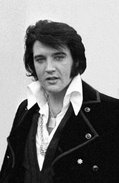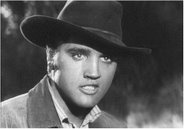 Not much has been written about Elvis's political views. In the early 1960s he described himself as an admirer of the Democratic President John F. Kennedy. In 1970 however he wrote to J. Edgar Hoover requesting to join the FBI at the height of its campaign against political activism. Most people were shocked at this, but his fans had mixed emotions. They wanted their hero making new movies and songs, but they were happy that Elvis had his feet firmly on the ground. In December of that year he met with President Richard Nixon. According to the Richard Nixon Library & Birthplace Foundation, the photograph of President Nixon's meeting with Presley in the Oval Office of the White House is the most requested image in the history of the U.S. Government.
Not much has been written about Elvis's political views. In the early 1960s he described himself as an admirer of the Democratic President John F. Kennedy. In 1970 however he wrote to J. Edgar Hoover requesting to join the FBI at the height of its campaign against political activism. Most people were shocked at this, but his fans had mixed emotions. They wanted their hero making new movies and songs, but they were happy that Elvis had his feet firmly on the ground. In December of that year he met with President Richard Nixon. According to the Richard Nixon Library & Birthplace Foundation, the photograph of President Nixon's meeting with Presley in the Oval Office of the White House is the most requested image in the history of the U.S. Government.It is known that Presley supported Adlai Stevenson in the 1956 election, though he later "refused to publicly endorse any candidate." Elvis also supported John F. Kennedy in 1960 and reportedly cried when he learned of his death. There is a picture of Elvis with President Lyndon B. Johnson, who he met in 1965. Elvis also supported Robert Kennedy in the 1968 election until his assassination. Between 1968 and 1970, Elvis recorded several political songs including "If I Can Dream", "In the Ghetto", "Change of Habit", and "Walk a Mile in My Shoes". He also starred in the political film Change Of Habit. Elvis also met and became friends with John Lennon and Bob Dylan in the 1960s, though he disapproved of The Beatles's anti-war activism and open use of drugs and later asked President Nixon to ban all four members of the group from entering the United States. According to the contemporaneous memo by Egil "Bud" Krogh, deputy counsel to the President, Nixon had a conversation with Elvis about the matter during the singer's visit to the White House. Peter Guralnick writes, "The Beatles, Elvis said, as if he were tentatively trying out a new tack, had been a focal point for anti-Americanism. They had come to this country, made their money, then gone back to England where they fomented anti-American feeling. 'The President,' Krogh's memo continued, 'nodded in agreement and expressed some surprise.' Presley indicated to the President in a very emotional manner that he was 'on your side.' Presley kept repeating that he wanted to be helpful, that he wanted to restore some respect for the flag, which was being lost." The singer "also mentioned that he is studying Communist brainwashing..." Guralnick adds, "Presley indicated that he is of the opinion that the Beatles laid the groundwork for many of the problems we are having with young people by their filthy unkempt appearances and suggestive music while entertaining in this country during the early and middle 1960s. He advised that the Smothers Brothers, Jane Fonda, and other persons in the entertainment industry of their ilk have a lot to answer for in the hereafter for the way they have poisoned young minds by disparaging the United States in their public statements and unsavory activities."
Indeed, in the 1970s Presley was a strong supporter of Republican President Richard Nixon. In his letter that he wrote to Nixon, requesting that they should meet, Presley told the President he was a huge admirer of everything he was doing, and asked to be made a "Federal Agent at Large" in order to help get the country off drugs. Nixon duly made Presley a "Federal Agent at large" in the Bureau of Narcotics and Dangerous Drugs, presenting him with the appropriate badge. Extraordinarily, Presley was likewise able to present Nixon with a gift of a Colt .45 handgun in the Oval Office. Although it probably has no relevance to his political beliefs, Elvis also met future President George H.W. Bush at an awards banquet.
Nothing is known of Elvis's views on Gerald Ford, but Elvis became a friend of Democratic President Jimmy Carter when he was Governor of Georgia. After Carter was elected to the Presidency, Elvis called him on the telephone at the White House several times. When Presley died in August 1977, "Carter said, 'He was unique and irreplaceable. He burst on the scene with an impact that was unprecedented and will probably never be equaled.' "






No comments:
Post a Comment